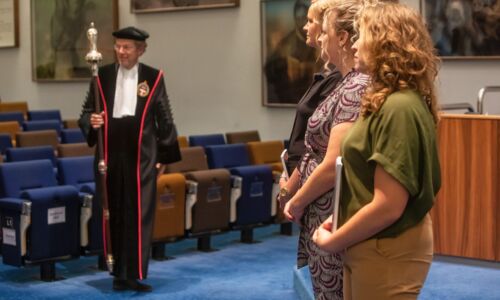Confidential Advisor must be easier to find, for students too
-
 Photo: Pixabay
Photo: Pixabay
Staff and students who are faced with undesirable behaviour at the university can turn to a Confidential Advisor. But not everyone knows that, and the scheme has some other shortcomings. So the rules are to be overhauled as of 1 September.
According to Associate Professor Inge Bleijenbergh, the fact that etiquette and safety within the Faculty of Philosophy, Theology and Religious Studies are being investigated shows once more that a good complaints mechanism and confidential advisors are really important to a university.
However, the regulation covering the reporting of the confidential advisors’ work must be structured properly. From within the Works Council, Bleijenbergh and colleagues have been busy the past year in talks with the Executive Board, to reach agreement on a new complaints mechanism. With success. Yesterday, both the Works Council and the Student Council approved the new document.
Key areas
The confidential advisors at Radboud University are responsible for various key areas. Some deal with undesirable behaviour, others with employment conflicts or academic integrity. And there is a special confidential advisor for the whistle-blower’s scheme. In 2019, a total of 87 applications were made for an interview with a confidential advisor. More than half of those were related to undesirable behaviour.
‘The situation at present is that many staff members are unsure how to locate the confidential advisor,’ says Bleijenbergh. ‘I have personally spoken to female PhD candidates who have experienced serious violations but did not even know that there were confidential advisors.’ According to Bleijenbergh, the Executive Board has agreed to better inform students and staff about the existence and role played by confidential advisors. There will also be more emphasis on prevention, through training sessions for staff and students.
Better protected
The new scheme allows for all confidential advisors to be merged into one central team. Up till now, the faculties followed their own approaches, with their own confidential advisors. Bleijenbergh: ‘From now on, all reports will therefore be registered centrally, with confidential advisors who are backed by the Executive Board. That way, the confidential advisors are better protected and able to work more independently.’
In the past, the confidential advisors were also social workers and the two roles sometimes overlapped in practice. That could be confusing for staff. ‘The new scheme offers clarity in that matter,’ says a satisfied Bleijenbergh. The roles of social worker and confidential advisor will no longer be carried out by one and the same person.
Another important point – for a university which is proud of its ‘multilingual campus’: from now on, students and staff who don’t speak Dutch will be able to apply for interviews without any language barrier. There will be multiple members of the central team of confidential advisors who are able to conduct a good interview in English – according to Blijenbergh, that wasn’t always the case within the faculties.
‘Many PhD candidates are reluctant to put pressure on their supervisors – there is an enormous dependence’
So is the scheme perfect now? No, it’s not, in Bleijenbergh’s opinion. ‘A certain dependence remains between the confidential advisor and their employer, the university.’ According Bleijenbergh, that can be resolved by working with an external ombudsperson. The participational bodies have been campaigning for that for years, and Bleijenbergh says that the Board has agreed to take action on the subject.
Bleijenbergh would also have preferred to see an extension to the period in which a person can lodge a complaint through the confidential advisor. ‘It’s now two years, with the exception of complaints of sexual intimidation. But look at the process of a PhD candidate: it can easily take five years for them to write their thesis. It must be made possible to report a supervisor after that period too. Many PhD candidates are reluctant to put pressure on their supervisors – there is an enormous dependence.’
Student associations
Not only staff but also students can approach a confidential advisor and be assured of support in lodging a complaint, for example about intimidating behaviour. However, only if the incident took place on campus, or is study-related. If something goes wrong in, for example, the club of a student association or changing room of a sports club, the university will not take action.
‘We would like to have seen that change’, says Ties van der Stappen, member of the Student Council. ‘It would have been clearer for students, where they should take their complaints, if all student organisations affiliated to the university had been included in the scheme.’
But the Executive Board found the risk too great. ‘According to the university, it cannot legally be held liable for anything that happens in clubs outside the campus.’ Van der Stappen and his colleagues were however able to convince the Board to include study associations in the scheme. ‘Because the activities they organise are often study-related and take place on campus,’ he adds. By way of a compromise, all members of study organisations will be invited to take part in a training session on social safety. ‘We’re happy about that,’ says Van der Stappen.



